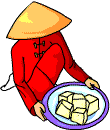h2g2 Literary Corner: Educational Tofu
Created | Updated Apr 16, 2017
Educational Tofu
How I Got There

Ed. Stuff: I was just talking to Icy North about the meanderings of idle research. I compared his stumbling over a wildly interesting factoid (while answering one of my questions) to what I do all day. I said, 'I'll end up someplace where I scratch my head and ask, "How did I get here"?'
Icy sagely replied, 'No, that's just senility – it's quite normal.' That's me told.
Then I started searching the Internet Archive for public domain works containing the word 'demon' in the title. That's because this month's Create Challenge contains the word 'devil'. I stumbled across a rather special Japanese novel called The Gold Demon, and decided to investigate. I didn't get very far, however – partly because my interest in translations of realistic novels of the Meiji period is somewhat limited, but mostly because the translator's introductory biography was quite simply the funniest thing I'd read in a long time.
The author of The Gold Demon, Ozaki Koyo, is a major figure in Japanese literature. Or so I gather. I think he might be comparable to Theodore Dreiser: a chronicler of social change and personal struggles. Ozaki Koyo was also highly influential, as he mentored other major literary figures. Good for him.
The translator, who is responsible for all the laughter on my part, is Arthur Lloyd. After some searching, I found out he was the Reverend Arthur Lloyd, an Anglican clergyman, born in Simla, India, who went out to Japan as a missionary. Rev Lloyd appears to have spent most of his missionary time studying Buddhism. He's kind of an odd fish, but seems Mostly Harmless.
Lloyd's biography of Ozaki Koyo is too good not to share. Here is an extract. If you want to read the book – hey, maybe you like Meiji literature in translation – here's that link again, enjoy.
I really need to get more organised. But then, I'd miss all this fun.
A Surprising Introduction
MR. OZAKI KOYO the author of the Novel "Konjiki Yasha" which is herewith presented to the English-speaking public in an English dress, though not exactly in an English translation, was born on December 16, 1866, in Shiba Katamonzen Cho, in Tokyo.
He was thus a true son of Yedo. More than that he was a child of Shiba, of that quarter of the Imperial City which more than all others has been noted for the high spirit and lively ways of its inhabitants. All the world knows that Shiba lies by the sea-shore, and its inhabitants, very many of whom are fishmongers, or otherwise connected with the fishing industry, seem to have imbibed a strong predilection for liberty from the remnants of the fresh sea-breezes that find their way to them across the dreary mud-flats of Shinagawa Bay. The purity of the sea-breezes may perhaps be doubted, but the Shiba love of liberty is above all suspicion. The district contains,
does it not? that bulwark of a nation's liberties, the great Keiogijuku1, and if that be not sufficient I would point my reader to the fact that whereas in other, more submissive, districts of the city, the barbers have made an unholy combine for the purpose of putting up, and keeping up, the price of that necessity of human life a morning shave, the freedom-lovers of the Shiba district have always succeeded in asserting their lawful freedom. What you have to pay ten, twelve, or even fifteen, sen2 for in their parts of the town, you can get a Shiba barber to do for half the price. Indeed I am told that you can be shaved in some parts of Shiba for three or four sen.
Ozaki's education was begun at a terakoya, or a temple-school, one of those "go-as-you-please " institutes of learning3 which flourished in the days before Meiji4, and which in many places contrived to linger on into the Meiji era itself. At this school the innate "Shiba spirit " was fostered and developed. He was a ' pickle5 ', and a fighter, and carried with him to his death a scar on the forehead, the memorial of a stone-throwing battle of his early days.

. . . He was now fifteen years of age, and his father, who wished to see his son prosper in
the world, began to urge him to begin the study of English, then, as now, one of the great high roads leading to success. He did so, but he did not like it. His text-book was Webster's Spelling Book. It is quite possible that he did not find his studies in English wildly exciting.
But if he disliked learning English, he disliked mathematics more6. He tells us in a short memoir of himself, which he once composed, that his mind was by constitution as much averse to mathematics as his stomach was to tofu7, the insipid bean-cake which enters so much into Japanese cookery.
Mathematics and English were in those days the staple articles of education – mathematics taught out of English text-books, and English taught by the hensoku method8 which discarded all sounds and appealed to the eye not the ear! It is not to be wondered at that a boy of Ozaki's temperament became restless, nor yet that he changed schools rapidly and eagerly. He went from school to school, from College to College, seeking intellectual sustenance, and getting intellectual tofu.
Ed. Stuff: Now, isn't that a brilliant way to introduce an author? Read the rest, if you have time. You'll probably end up like me: I now know slightly more about Meiji Japan than I did before. Knowledge is always a good thing.
